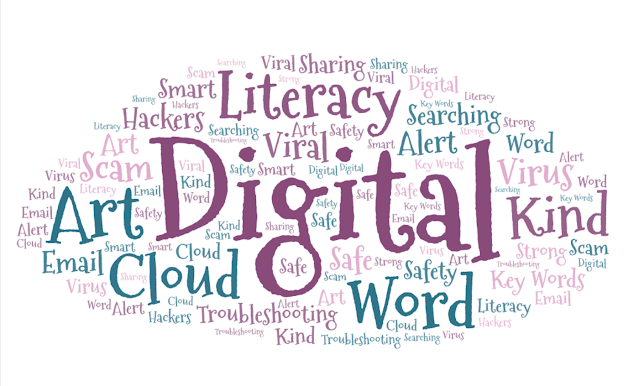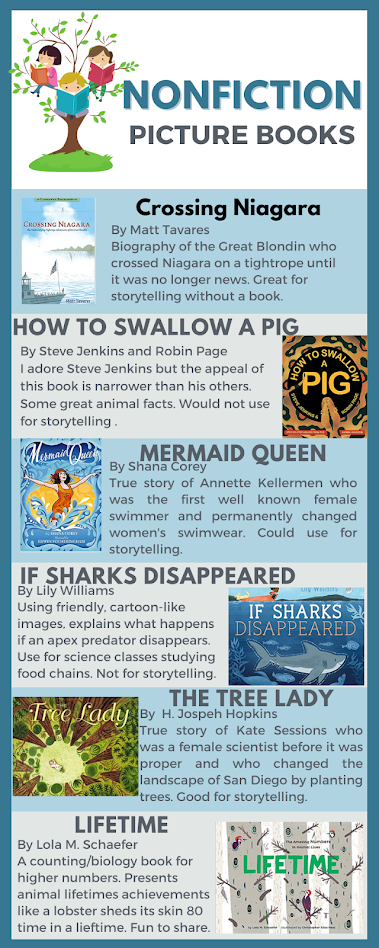Engage (or survive)
There are not many "famous" school librarians. In my head, Amy Hermon, host of the podcast School Librarians United is one of them. School Librarians United had its first episode in 2018, this week marks episode 210. As Amy mentioned multiple times, only one of her episodes mentions the AASL standards. "There just isn't an interest," she claims.
The shared foundation I wanted to focus on for this interview was Engage. And in the sense that we problem solved, respected others viewpoints' and created new knowledge, we engaged. I really don't know how Hermon engages her students at school. She had a lot to say, none of it good, about the AASL standards and the state of libraries in Michigan. Even I asked direct questions where I defined the engage foundation and asked if she thought she did any of this, she didn't really answer the question. Most of this post will focus on questions 4 & 5.
4. What are some of the challenges that you face when trying to implement these competencies?
5. Are there any other comments that you would like to make regarding the Shared Foundation / Competencies and Domains that we have discussed today?
Amy has opinions on the shared foundations of AASL. In fact, she isn't familiar with the standards. In her 16 years of being a school librarian, she has never once thought about them. They have never been part of her evaluations. When Amy collaborates, she works to meet the needs of the administrators, teachers, students. While she sees critical thinking, reflecting, ethical knowledge sharing, etc. as things that happen in the school, they do not generally fall under Amy's domain. According to Amy, states like South Carolina, Georgia, and Texas can think about the standards because they are growing and building schools. In the Midwest, she says, we are shrinking and closing schools. Principals, she explained, don't want certified school librarians; they want educational technology experts and instructional support, "Where were the standards when I photocopied, laminated, and had to close the Learning Common to reset Chromebooks? By the AASL standards, I’m failing. You do what teachers, students and administrators require. They don't care about the standards. They are removed from the reality of the job." Amy feels like the standards were written by "experts" who have not been in the classroom for 15-20 years. Administrators here have not even heard about the standards she says.
Amy currently works in an IB high school in Metro Detroit. For 14 years though, she worked in elementary school libraries in a nearby district (9 of them at once!). In that district, the school library curriculum was alligned with AASL standards ( the standards prior to 2018) , but no one ever talked about the standards.
Lest you think Amy doesn't like being a school librarian, Amy pointed out that she's been a school librarian for 16 years. She is at heart, an educator, so public libraries do not appeal to her. She loves the work of a school librarian, but somedays, like the one in which I interviewed her, she was frustrated with administrators that clearly did not value her as a librarian. But Amy, for the love of the job, spends her free time, interviewing on the ground experts for a podcast that been growing since 2018. I asked her about Engage, but her anger over the irrelevance of the standards in a state where school librarians keep getting cut won out.
I loved speaking with Amy. I appreciated her candor and passion. And if you don't already listen, her podcast is wonderful and inspiring. Honestly, after being schooled in a state like South Carolina, hearing a completely different viewpoint that feels more accurate to what I have seen, was refreshing. I don't think the standards are irrelevant, but every school librarian in Michigan that I've met so far, has so many non-librarian duties on her plate, that I understand Amy's perspective. In a state like this, where school librarians are not valued, if you land a job, you focus on doing what the administration desires before you consider the standards. Reporting on how the library connects to the curriculum, on participation and circulation statistics, and on research showing the value of libraries is probably more helpful than connecting to standards the principals are not aware of.





Comments
Post a Comment